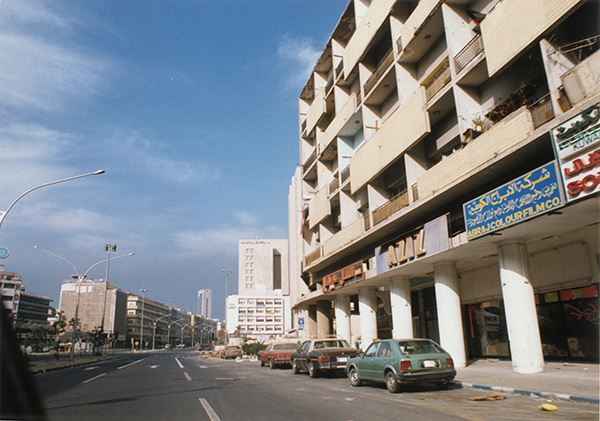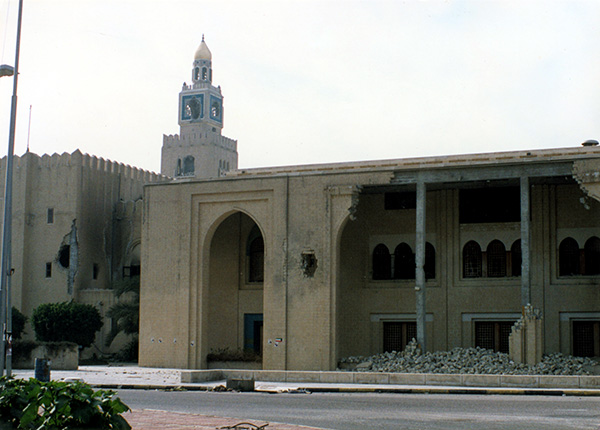‘Picture is black and horrifying’: The day the world stood still
Saddam’s adventurism triggered massive rifts among Arabs

Cairo: On August 2, 1990, the world woke up to the news of a dawn invasion by Iraq of neighbouring Kuwait. The incursion sent shockwaves across the globe and triggered rifts in the Arab world, the repercussions of which persist until today.
Hours after the invasion, the Iraqi forces gained ground inside Kuwait, which together with its ally the US requested the UN Security Council to hold an emergency meeting. The world body held the first in a string of sessions on the crisis, condemning the Iraqi act and demanding withdrawal.
The Security Council later adopted resolution 661 imposing international sanctions on Iraq, a move that Baghdad shrugged off. The then US president George Bush announced that US Navy ships had been deployed to the Gulf in response to the invasion.
Three days after the Iraqi attack, Kuwaiti emir Jaber Al Ahmed Al Sabah set up a government in exile in neighbouring Saudi Arabia.
Cracks emerge
Already gathering in Cairo for an Islamic meeting, the Arab foreign ministers were called for emergency talks under the umbrella of the Arab League over the Iraqi invasion. As the ministers huddled together at the Nile-side Semiramis Hotel in Cairo on August 3, cracks started to surface among them.
An Arab League resolution denouncing Saddam Hussein’s move and demanding an unconditional pullout of his troops from Kuwait was not unanimously backed. It was passed with 14 countries in favour. Iraq objected to the resolution. The Palestinian delegate expressed reservation while Jordan and Mauritania opposed it. Yemen and Sudan abstained from voting. Libya stayed away from the talks.
Iraq decried the resolution, calling it “null and void”, allegedly for not conforming to the sixth article in the Arab League charter that makes unanimity mandatory in the pan-Arab bloc’s decision-taking mechanism. Anyhow, the divided Arab officials deferred the crisis to the heads of their respective countries whom they called to consider an emergency summit.

Empty streets of Kuwait City during the Iraqi occupation of the Gulf state.
Military buildup swells
As Saddam’s forces virtually wrested control of Kuwait, fears mounted in the Gulf that Iraq could shift its sights to the oil-rich region. Those fears gave rise to military alliances with foreign powers, mainly the US. On August 6, then US defence secretary Dick Cheney travelled to Riyadh where he met Saudi King Fahad Bin Abdul Aziz and discussed the dispatch of American military troops.
In an apparent attempt to give his occupation of Kuwait a religious mantra and woo Muslims, Saddam emblazoned the Iraqi flag with “Allah is the Greatest” phrase. On August 7, US troops started arriving in Saudi Arabia, fueling expectations for a military showdown with Iraq.
Bush said the aim of the buildup was to stop Saddam’s forces from sweeping into Saudi territory.
Bleak prospects
For his part, Egypt’s then president Hosni Mubarak, a vociferous critic of the Iraqi invasion, sounded the alarm for the Arabs. “The picture is black and horrifying,” Mubarak said at a press conference in Cairo. “Unless we reverse the situation, war is inevitable,” he added, calling on Saddam to pull his forces from Kuwait. “No-one knows perils of war more than me,” added Mubarak, an ex-army officer. The Arab leaders were called for a crisis meeting in Cairo on August 8. The following day, Saddam declared Kuwait Iraq’s 19th province, further complicating the situation. As Arab leaders gathered in Cairo on August 10, Saddam urged Muslims to wage jihad (holy war) against the US forces in Saudi Arabia and lashed out in public against King Fahad and Mubarak, accusing them of bringing the American forces to Arab lands.

The Iraqi invasion, occupation and the war that followed led to a lot of destruction in Kuwait.
Divisive resolution
Saddam sent his deputy and confidant Taha Yassin Ramadan to attend the summit on his behalf.
Addressing the summit, the Iraqi official accused Kuwait of having plotted with the US to strike at his country, claiming that the Iraqi invasion had “aborted” that conspiracy. Head of Kuwait’s delegation to the summit, Saad Al Abdullah Al Sabah, rebutted Ramadan’s allegations and blasted Iraq’s occupation of his country, saying it “violated principles of Arab fraternity”.
Some Arab summiteers, including Sudan’s then president Omar Al Bashir and Palestinian leader Yasser Arafat, proposed a delegation of Arab leaders go to Baghdad to meet Saddam. The proposal did not elicit enough support amid the Iraqi dictator’s escalatory moves.
Marred by splits, the summit wrapped up with a resolution that condemned the Iraqi invasion and called for the reinstatement of Sheikh Jaber as Kuwait’s legal ruler. The resolution, moreover, nullified any results of the Iraqi occupation and demanded Iraq’s withdrawal from Kuwait. The resolution also denounced Saddam’s threats to the Gulf countries and backed Saudi Arabia’s steps to defend itself — an apparent reference to the US-led military buildup there.
Inter-Arab divisions became sharper. Out of the 20 Arab countries that attended the summit, only 12, including hosting Egypt, voted for the resolution. Algeria and Yemen abstained while Sudan, Mauritania and Jordan expressed reservations. Iraq, Libya and Sudan objected.
“The summit witnessed attempts to abort it, especially from the Iraqi delegation who had requested that Kuwait should not be represented because they had annexed it to Iraq,” remembered Mubarak in an interview published in May last year.
“After getting parliament’s approval, I sent Egyptian troops to Saudi Arabia as part of the alliance forces to liberate Kuwait,” he added in the interview with well-known Kuwaiti journalist Fajr Al Saeed.
Mubarak, who died in February, had launched a series of appeals to Saddam to retreat from the brink and avoid war by disgorging Kuwait. His calls fell on deaf ears in Baghdad. “I had not imagined that Saddam would embark on such action. An Arab country attacks and occupies another sovereign Arab country? This is absurd,” he said.
Mubarak had visited Baghdad a week before the invasion and met Saddam who reassured him that he would not attack Kuwait.
Lasting repercussions
“Kuwait’s invasion has cast its shadows on deterioration of the Arab situation until today,” the Egyptian leader said.
“The Arab world has split up like never before. Foreign intervention and ambitions have found in it an opportunity to work.” Agreeing, veteran Egyptian historian Mohammed Hassanein Haykal portrayed the post-invasion Arab world as shambolic. “The situation was chaotic and underlined full Arab helplessness,” Haykal wrote in his book “The Gulf War: Illusions of Power and Victory”. “Prospects for reaching an Arab solution to the crisis faded away,” he added.
The scene was thus set for a US-led multinational military campaign that eventually flushed Saddam’s troops out of Kuwait after seven-month occupation.